Learn about the size of a network cabinet and how to choose a network cabinet that suits your needs
In the article 'What is a network cabinet? The function of the network cabinets for the server ', we have come together to learn and understand some basic information about the network cabinets. Network cabinets are an indispensable component for every server system as well as the data center. However, the size of the network cabinets? How to choose the right size product suitable for actual use and floor area of the data center? These are all frequently asked questions during server setup, and we will find the answers together now.
- Instructions for creating a Web host in your home or office - Part I
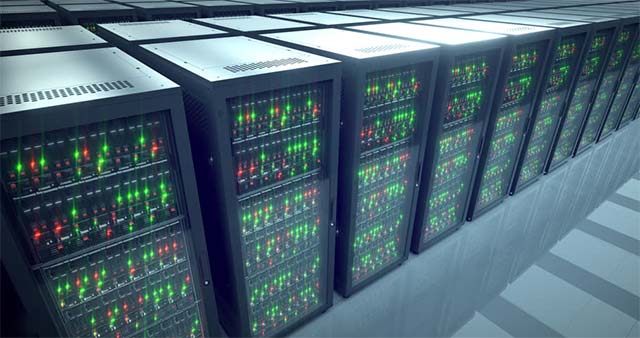 A network cabinet is a combination of hardware structures designed to accommodate technical equipment
A network cabinet is a combination of hardware structures designed to accommodate technical equipment
Choose the right size network cabinets
- Summary of network cabinet size
- The height of the network cabinet
- Depth of network cabinets
- Classification of network cabinets and some typical network cabinet size options
- Small network cabinets: From 1U to 12U
- Medium size network cabinets: 18U, 22U and 32U
- Large network cabinets: 42U, 45U and 48U
- Summary of some typical types of network cabinets
Summary of network cabinet size
As we know, network cabinets come in many different types and sizes, depending on the specific needs of data center managers, businesses (size and type, business operations of the company). , and the physical size and number of hardware devices that will be placed in that network cabinet.
 Network cabinets have many types and sizes
Network cabinets have many types and sizes
Usually the network cabinets have a common width of 600mm, the parameter that you need the most attention is the height and depth of the cabinet. These two indicators will show the amount of space that the network cabinet owns, thereby building an appropriate installation and arrangement of hardware equipment.
- How to set up a VPN server on Windows without using software?
The height of the network cabinet
The height of the network cabinets is calculated in separate units, called U or ru (rack unit, rack unit). In particular, 1U = 1.75 inch (4.45cm), common sizes for you to choose include 42U, 36U, 27U, 20U, 15U, 10U . More specifically, a 9U network cabinet (standard size) will 19 inches (approximately 48cm) wide and 15.75 inches (approximately 40cm) high.
 The height of the network cabinet is calculated in separate units, called U or ru
The height of the network cabinet is calculated in separate units, called U or ru
In general, determining the height of the network cabinets is very important. You should not only consider the current use needs but also the future developments of. Be sure to choose the type of closet so that you can comfortably arrange hardware devices and cable routing in the most scientific way. This is not just a matter of whether you can fit the necessary equipment into the network cabinets, but also to promote ventilation, clean and neat inside the cabinet space. A spacious network cabinet, devices that are arranged in harmony will certainly give better cooling effect, more safety, and help improve the performance of the server.
- It only took Nvidia 3 weeks to create one of the world's most powerful AI supercomputers
Depth of network cabinets
Once you've selected a network cabinet that is the right height for your needs, the next thing you need to do is consider the cabinet depth. Without carefully calculating the depth of the cabinet, you may end up buying the wrong type of cabinet that does not meet your requirements. In addition, the size of the equipment placed in the cabinet and cable routing diagrams are also useful reference factors that help you shape the cabinet depth.
- Increase Internet connection speed by VPN virtual private network solution
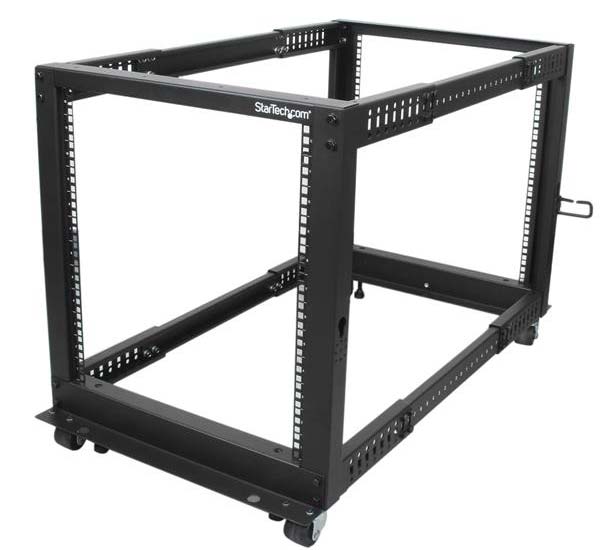 If not calculated carefully, you may end up buying the wrong type of cabinet whose depth does not meet the requirements
If not calculated carefully, you may end up buying the wrong type of cabinet whose depth does not meet the requirements
Determining the depth of the network cabinets is also not a simple task because there will be many factors that you must consider. Information about the depth of the network cabinet will include several parameters:
- Overall depth: Include the distance between the front and back of the cabinet as well as the thickness of the doors.
- Maximum depth of use: It is the distance between the front and the back (front and back doors) of the cabinet, the thickness of the door, as well as every other part of the cabinet such as the bearing beams or parts, connecting Other additional profiles.
- Maximum distance between racks: Normally in a network cabinet there will be at least 4 component racks, evenly divided between the front and the back of the cabinet. In fact, the width between the standard 19-inch brackets, however, the distance from the front stand to the back side is adjustable. Thus the maximum distance between the supports is the position after they are adjusted to the maximum distance from each other.
- Maximum depth that can be set up: Small type network cabinets. Usually the maximum depth that the appliance can be placed will be equivalent to the internal depth of the cabinet when the brackets are placed furthest away from each other.
In summary, the height of the network cabinets is calculated in units U (1U = 4.45cm). The sizes to choose from include 42U, 36U, 27U, 20U, 15U, 10U, and the cabinet depth is 500, 600, 800, 1000, 1100mm. In general, the area of a network cabinet will depend on what devices you need to put and how much is in that network cabinet.
Obviously, the need for the size of a small retailer's network cabinets will be different from the needs of a large telecommunications company or a medium-sized office.
- This is the most beautiful data center in the world, and it is located in the church of God
Classification of network cabinets and some typical network cabinet size options
There are many ways to classify network cabinets, according to features and price, but the most common is to classify them according to cabinet size. Here are 3 typical network cabinets group by size.
Small network cabinets: From 1U to 12U
This is the most commonly used group of network cabinets for basic information technology needs (in offices, small businesses). They can vary depending on the particular situation, in which space, traffic and hardware device size are factors that must be taken into account.
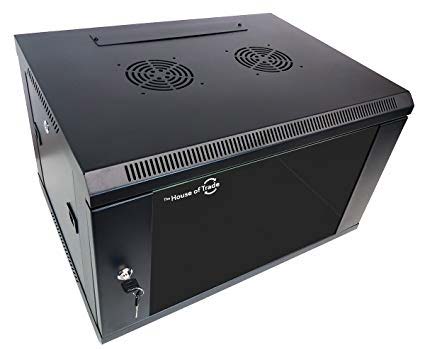 Small network cabinets are often installed in limited spaces, even wall mounted
Small network cabinets are often installed in limited spaces, even wall mounted
Small network cabinets (from 1U to 6U) are usually installed in height-restricted spaces, even wall mounted. Network cabinets of this size are often found in use cases involving telecommunications management as well as monitoring equipment.
It is also important to consider the weight of the network cabinet as in fact, some devices (such as UPS) may be bulky, heavy, and need a stronger network cabinet.
- Supercomputer survived 1 year on the international space station ISS nothing special?
Medium size network cabinets: 18U, 22U and 32U
These are the most commonly used network cabinets in small and medium sized companies and offices. Telecommunication devices, servers and network equipment can be installed in these cabinets, allowing for easier routing and cable routing, while ensuring a well-ventilated space. Inside cabinet space, support overall cooling capacity.
- Japan tests the world's most powerful nuclear synthetic supercomputer
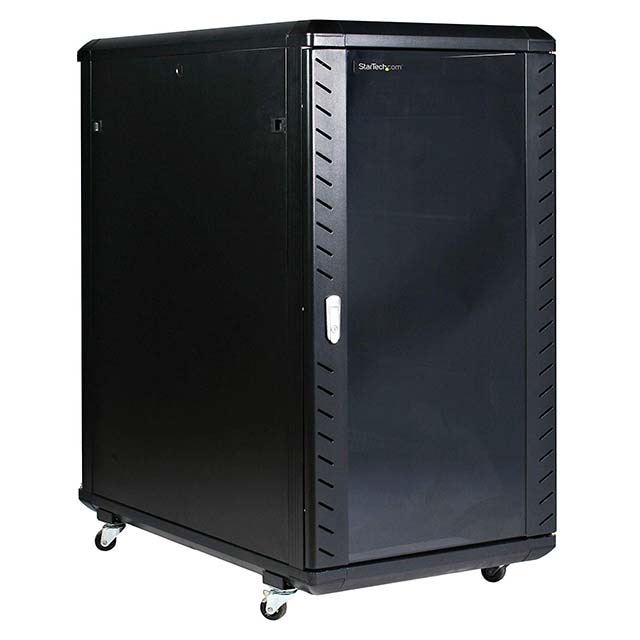 Medium-sized network cabinets are often fitted with wheels to make them easy to move around
Medium-sized network cabinets are often fitted with wheels to make them easy to move around
Some advantages of cabinet sizes from 18U to 32U include:
- Easy and quick assembly
- For excellent portability (most network cabinets this size are mounted as wheels to be easily moved from place to place)
- Provides high flexibility in many mounting and placement options thanks to adjustable mounting options, such as removable doors
- Ensuring security and safe operation, the structure allows airflow from outside to inside and vice versa more effectively
Large network cabinets: 42U, 45U and 48U
Cabinets models in this segment are sometimes called Higher-U. In particular, 42U network cabinets are the most commonly used type, often used for professional audio and video equipment, and of course, to accommodate both large-scale servers and network systems. This size allows a technician to efficiently organize all hardware components, while still saving the space needed for many needs - a very important feature when it comes to systems made up of a large number of devices.
Companies operating in the field of providing network services and automated hardware equipment are the subjects that require the use of large-sized network cabinets, most popular in the range from 45U to 48U.
- What are quantum computers and how did people develop this technology?
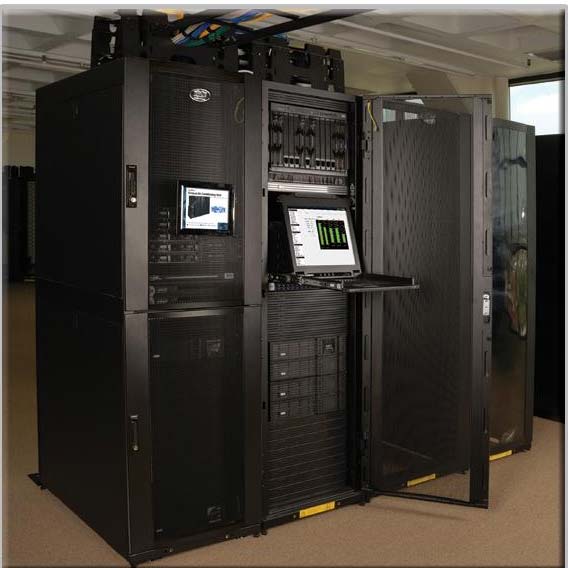 Large network cabinets are usually made up of sturdy metal frames, fixed in data centers
Large network cabinets are usually made up of sturdy metal frames, fixed in data centers
Such large network cabinets are usually made up of sturdy metal frames, stand on the floor and sometimes they can also be customized to reach the size of 58U in some special cases. the participation of a large number of different hardware devices, for example, in the data centers of large online service providers.
In addition, this type of network cabinet offers the ability to support future device expansion - a great benefit for fast-growing businesses, who can upgrade the system scale as needed without having to invest. from new network cabinets. They are also a good choice if you need more space for cabling and other connectivity needs.
Compatibility with additional accessories is also an important feature for network cabinets. This type of large network cabinet is often designed in a way that maximizes maintenance of the equipment, helps the air flow efficiently and allows the deployment and installation of dismantling plans simply and quickly.
- Compare smartphones and desktops: Why are phones slower than computers?
Summary of some typical types of network cabinets
Below is a summary of some of the most commonly used server network cabinet sizes on the market today. Invite you to consult to find out for themselves the product that best suits the actual needs.
Type of network cabinet Height (cm) Width (cm) Depth (cm) 6U (A) 36.8 60 45 6U (B) 36.8 60 60 9U (A) 50.1 60 45 9U (B) 50.1 60 60 12U 63.5 60 60 18U 98.8 60 60 22U 116.6 60 60 32 161 60 60 42 (A) 205.5 60 60 42 (B) 205.5 60 80 42 (B) 205.5 60 100Wish you build yourself a satisfactory system!
You should read it
- ★ Compare moisture-proof cabinets using IC technology and drying absorption technology
- ★ Types of data center design
- ★ Evaluate quality 40-liter Fujie moisture-proof cabinets
- ★ Evaluation of advantages and disadvantages of Fujie AD030 moisture-proof cabinets
- ★ 4 reasons to convince users to choose Fujie moisture resistant cabinets